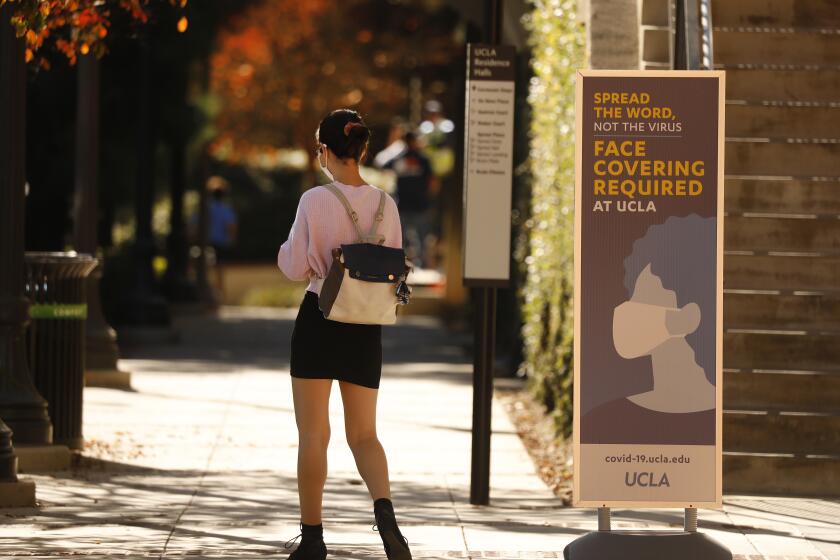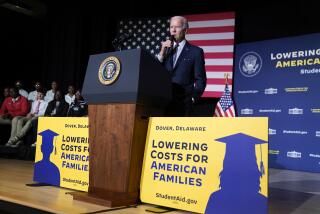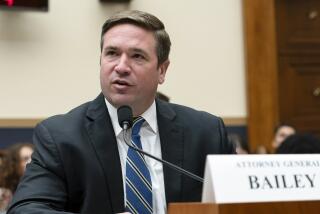Op-Ed: I’m drowning in student loan debt. Here’s why Biden needs to help teachers like me
I am a public school teacher, though sometimes it feels like I work for the company store.
For five years, I have been making monthly payments on a student loan that started out at $50,000 but has grown to $59,000 because of accrued interest. So far, I have paid down the principal by a whopping $97.
To survive in this profession, I need help. So do my fellow teachers. We need student loan cancellation and a robust national loan forgiveness program for teachers.
Last month Sen. Charles E. Schumer (D-N.Y.) again urged President-elect Joe Biden to forgive up to $50,000 in student debt per borrower through executive action, without legislation. This would help relieve the student loan burden of some 45 million Americans and boost the economy.
Biden has suggested he would support a more conservative $10,000 figure, which economists say would help the most vulnerable borrowers.
Some economists argue that the $50,000 amount would disproportionately benefit higher-income college graduates with advanced degrees — such as doctors and lawyers — who hold the most student debt but whose higher salaries put them in a better position to pay back loans.
Although the smaller figure could wipe out debt for nearly 15 million borrowers who owe $10,000 or less, over 60% of us owe more than that.
And it wouldn’t do enough to help teachers.
My profession requires additional schooling beyond a four-year degree — at the least, a one-year credentialing program. Because most school districts pay higher salaries to those with advanced degrees, a little over half of public school teachers also hold master’s degrees. Teachers’ stagnated wages, however, lag significantly behind those of similarly educated professionals.
The average student loan debt of a U.S. teacher now hovers around $37,000, which is only slightly less than the average teacher starting salary of $38,000. Teachers with master’s degrees end up owing about $48,000.
I’m one of the 67% of teachers who hold federal student loans. I earned my teaching credential and master’s in education at UCLA, which has one of the country’s top public education programs. I am grateful for the training I received. The debt, not so much.
But Biden’s proposed $10,000 in loan forgiveness is only slightly more than the interest I’ve accrued since graduating. It would do little for me and many other current and future U.S. educators.
Reducing the loan burden would help millions of students, but particularly Black and Latino graduates, who tend to receive lower wages, another manifestation of structural racism.
As it stands, the federal government forgives pitifully little when it comes to teacher loans. It does have a Teacher Loan Forgiveness Program, which forgives only $5,000 after five years of service in a high-needs school.
States offer a baffling hodgepodge of partial forgiveness programs, leaving most educators to hold out for Public Service Loan Forgiveness, a federal program designed to encourage students to enter relatively low-paying careers such as teaching. But you have to make 10 years’ worth of payments before you can even qualify for tax-free forgiveness.
During the Trump administration, 99% of Public Service Loan Forgiveness applicants have been denied, effectively invalidating the program and sparking a congressional investigation. Biden is likely to restore the program, but that won’t be comprehensive enough to meaningfully relieve the debt burden teachers carry.
Meanwhile, the pandemic has made a difficult career nearly impossible. Teacher workloads have doubled and burnout is on the rise. Nearly 30% of educators are considering retiring early or leaving the profession, which could lead to a dramatic teacher shortage that could threaten Biden’s vow to reopen most schools within his first 100 days in office.
When students do return to classrooms, educators will face an enormous national challenge — helping students recover from a year or more of pandemic trauma and lost learning. To address this, we will need more than bodies in buildings. We’ll need more highly trained teachers.
What we won’t need are underprepared people whisked through emergency credential programs and Teach for America crash courses that last five to eight weeks. Such underprepared teachers leave the profession at two to three times the rate of teachers with traditional training, and they are more likely to serve low-income students of color — precisely those who will need the most support as we emerge from the pandemic.
A generous loan forgiveness program would encourage teachers to enter and stick with the profession. It also would attract a more diverse workforce, imperative in this time of national reckoning over race, when more than 80% of students who major in teacher education are white. The burden of student loans weighs more heavily on Black and Latinx teachers, who are more likely to hold loans and struggle to repay them. Giving these teachers an incentive to pursue and remain in the profession also benefits students: having just one Black teacher can lower dropout rates and increases college enrollment among Black students.
Teachers deserve to pursue high-quality training without being laden with insurmountable debt. Students deserve highly trained teachers who aren’t also working second jobs as they struggle to make ends meet. Teacher loan forgiveness would be an immediate first step toward ensuring quality instruction and making teaching a more financially viable career.
An obvious alternative to loan forgiveness would be to simply increase teacher pay, but that would likely be a low priority in a recovering post-pandemic economy. Doing so would require passing new tax legislation.
In his presidential victory speech, Biden claimed it was “a great day” for educators. He should show us he means business by instituting an unsparing loan forgiveness program as soon as he takes office.
Lauren Quinn is a high school English teacher in Los Angeles. @LLcoolquinn
More to Read
A cure for the common opinion
Get thought-provoking perspectives with our weekly newsletter.
You may occasionally receive promotional content from the Los Angeles Times.











